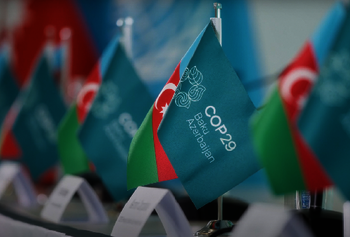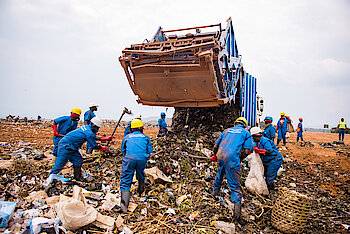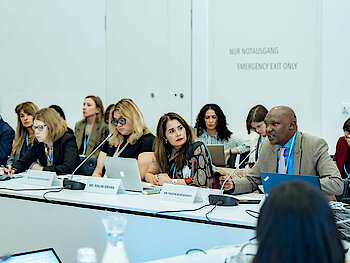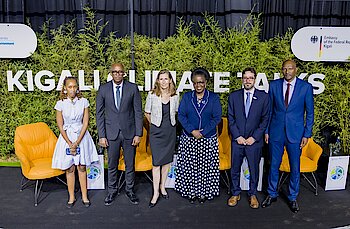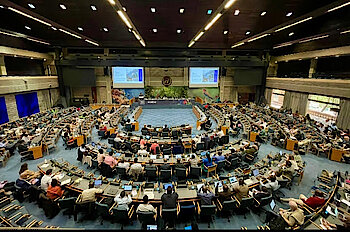
REMA AND HIGHER LEARNING INSTITUTIONS AGREED TO ENHANCE PARTNERSHIP IN ENVIRONMENT AND CLIMATE CHANGE RESEARCH
As part of the “World Environment Day Celebrations”, Rwanda is holding its annual National Environment Week. The week begun on Saturday 28 May by the community work known as “Umuganda” and will run upto 5th June 2022. As part of the “National Environment Week”, today, REMA in partnership with University of Rwanda (UR) College of Science and Technology, gathered senior management representatives from public and private higher learning institutions to share with them findings of the 6th State of Environment Report and Outlook (SoER).
The National Environment Week activities also include dissemination of Rwanda’s first Biennial Update Report under the United Nations Framework Convention on Climate Change (UNFCCC) 2021 and the 6th State of Environment Report and Outlook in Higher Learning Institutions. We will also hold a joint inspection between RAPEP in mining and Debriefing and a presentation on Bond Calculator. It is also planned to conduct an exchange field visit engaging Civil Society, NGOs with Environment and Climate change projects funded by RGB, and World Environment Day Celebrations. The main objective of this workshop is to disseminate the findings of the State of Environment Report and engage the academia for a productive exchange, regarding research needs and opportunities in Rwanda for environment and climate change.
“As the State of Environment Report and Outlook (SoER) report advises policy action, more real, appropriate action must be taken. That is why there was no better place to start this dissemination, other than universities and other higher learning institutions, to increase ownership and consolidation of data through research”. “How can the next State of Environment and Outlook report be generated by our own researchers? Is it possible that the next report refers to data generated from research carried out by the lecturers or students from our public and private higher learning institutions? “Added the Director General, Juliet KABERA.
On behalf of the Dean of the college of Science and technology, the acting Dean, Dr. Denis Ndanguza appreciated REMA for choosing to start with academia as a first stop to disseminate the 6th State of Environment Report and Outlook (SOER) report and share constructive ideas.
“This initiation to share information will help the higher learning community”, he said. “Lectures are good learners; we are going to be good ambassadors and increase innovative projects that can impact environment and climate change and increase knowledge on new concepts such as circular economy” - Dr. Denis Ndanguza.
After presenting findings in the 6th State of Environment Report and Outlook (SOER) report, senior Managers from public and private higher learning institutions provided recommendations and comments for gaps identified. Both REMA and higher learning institutions agreed on establishing stronger collaboration, start the conversation on mainstreaming environment and climate change into university curricula and improving the report by including business opportunities to each chapter. The senior representatives also appreciated REMA and its partners for the research support provided to them through grants; they requested that this collaboration continues as guided by the new task force.
Note to Editors
On January 5th 2018, the University of Rwanda signed a Collaborative Agreement with the Rwanda Environment Management Authority (REMA) to support postgraduate students conducting research for their masters’ theses. After affixing signatures to this agreement, the Center of Excellence in Biodiversity and Natural Resources Management (CoEB), College of Science and Technology took a lead to coordinate all related activities. Since then, students and supervisors have been benefiting from this partnership in different ways. So far, a total of sixteen masters’ from two UR Colleges (Colleges of Science and Technology and the College of Agriculture and Veterinary) and four different Masters programs; have been awarded grants under LAFREC
In addition, last year, REMA through the National Adaptation Planning Process (NAP) Project provided 50 fully-funded scholarships to 25 scholars and 25 lecturers of the University of Rwanda (UR) to conduct research on nature-based solutions that harness biodiversity and ecosystem services to reduce Rwanda’s vulnerability and build resilience to climate change.
END
Topics
More posts
What to expect from the COP29 at Baku ?
It will be a twenty ninth time, that all countries which are parties to the United Nations Framework Convention on Climate Change (UNFCCC) meeting to…
Rwanda and Germany Host Second Kigali Climate Talks
The second edition of the Kigali Climate Talks has explored the role of climate finance in building Rwanda’s resilience and capacity to adapt to…
GREEN RWANDA AT UNGA79: ENDING PLASTIC POLLUTION AND ADVANCING CLIMATE ACTION
At the 79th United Nations General Assembly (UNGA79) in New York, Rwanda’s Ministry of Environment demonstrated its commitment to global environmental…
Rwanda and Sweden Sign Memorandum of Understanding to Cooperate on the Implementation of Article 6 of the Paris Agreement.
Today, the Swedish Energy Agency, representing the Kingdom of Sweden, and the Ministry of Environment of Rwanda signed a Memorandum of Understanding…
Rwandans urged to double efforts in combating rising air pollution
Rwanda joined the rest of the world on September 10, 2024 to mark the International Day of Clean Air for Blue Skies. During this observance, the…
Rwanda to embark the development of Short-Lived Climate Pollutants Plan
Image: Nduba Landfill in Kigali City, (The landfll is known as one source of methane gas which is the greenhouse gas and the short lived pollutants);…
RWANDA’S NEGOTIATORS ARE IN BONN PUSHING FOR CLIMATE FINANCE
Rwanda’s negotiators led by Mr. Faustin Munyazikwiye – Deputy Director General of the Rwanda Environment Management Authority (REMA) – are in Bonn,…
Rwanda and Germany launch the “Kigali Climate Talks”
On 9 May 2024, Dr Jeanne d’Arc Mujawamariya, Rwanda’s Minister of Environment, and Heike Uta Dettmann, Ambassador of the Federal Republic of Germany,…
Tackling Short-Lived Climate Pollutants: Insights from CCAC2024 Conference
The Climate and Clean Air Conference 2024 (CCAC2024), took place in Nairobi, Kenya, on the sidelines of the Sixth session of the United Nations…
